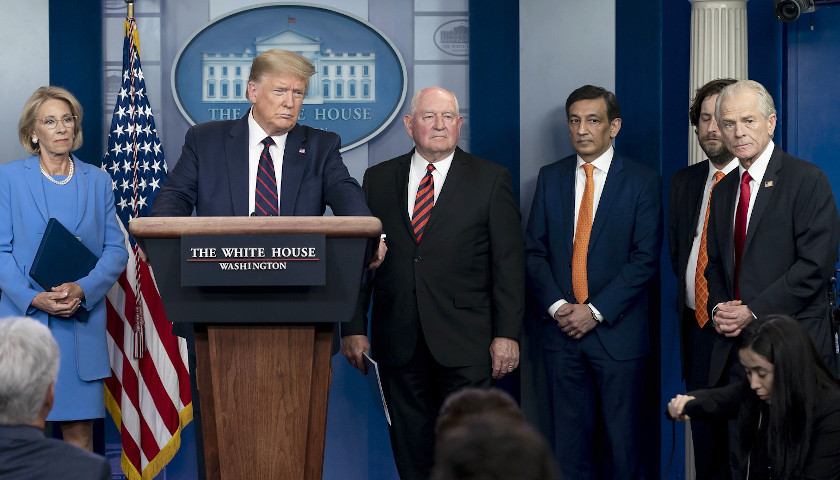by Angelo Codevilla
The New York Times on Tuesday reported: “The numbers the health officials showed President Trump were overwhelming. With the peak of the coronavirus pandemic still weeks away, he was told, hundreds of thousands of Americans could face death if the country reopened too soon.”
These numbers, many millions of infections, hundreds of thousands of deaths, were ones that “health officials” had been spreading through a sensation-hungry media for some time. Together with a poll question that framed the choice just so, they had already helped produce another set of numbers: “Voters overwhelmingly preferred to keep containment measures in place over sending people back to work prematurely.”
This, the Times crowed victoriously, had stampeded President Trump to abandon his goal of restoring normal life by Easter.
Trouble is, though, these numbers come from just some doctors—they reflect neither reality nor broad medical opinion. They are synthetic products that hide the (often ignorant) assumptions that they reflect, substitute for reason, foster panic, and ruin the country.
The following shows how “soft” and hence divorced from reality these numbers are, what it would take to produce “hard” numbers—i.e. ones reflective of reality—and the manner consistent with self-government in which such matters should be debated and decided.
All admit that the numbers that are scaring the sense out of the country are mathematical projections. All projections are based on assumptions about the ever-changing numbers of “confirmed cases” of COVID-19, as well as of deaths resulting therefrom. But few—and here it seems we must include many “health officials”—consider that the latter numbers are themselves “soft” and tell us next to nothing about how much, how little, or what kind of dangers the virus poses to us.
Certainly, they give no guidance about what restrictions any of us should apply to ourselves, never mind what the government should do to the country.
How’s that? Because the number of “confirmed cases”—meaning cases that have come to the attention of the medical profession—tells us nothing about the number of people infected. Nor does that number tell us what happens to the gamut of those infected. Nor is the number of deaths “hard,” because it does not distinguish between those who die of the virus and those who die merely with it (that is, they might have died even without it).
To make intelligent decisions about countermeasures, we would need have hard data about all these matters. Yet, for two months, doctors such as Anthony Fauci have messed up millions of lives and commandeered trillions of dollars while scaring the hell out of people and watching curves based on projections based on meaningless numbers. Watching the several curves resulting from the testing that is now ongoing and that is projected to continue as the country suffers will provide only more guesses, that will feed more models and more disputes.
The most important fact about COVID-19, its true mortality rate, is the number who die of the virus divided by the number infected by it. No algorithms. Simple arithmetic.
In short, Fauci, et al., are showing themselves to be typical of our bureaucracy: over-credentialed, entrusted with too much power, and dangerously incompetent.
Learning the true figures about precisely what danger the virus poses to whom must begin by taking into account one thing we know for sure about COVID-19: that many, if not most, of those infected by this unusually contagious virus show few or no symptoms. This suggests eventual near-universal contagion.
But we don’t know how many of these asymptomatic people there are. Hence, meaningful epidemiological testing must include a random representative sample of the population, regardless of whether they are presumed to be infected or not. The numbers resulting from monitoring what happens to the health of individuals in this sample over a few weeks would tell exactly what percentage of people in each category and subcategory suffer what consequences from whatever contact with the virus they happen to have.
As it happens, a sizable chunk of such data is about to come into existence. The virus is rampant among the 5,000 or so personnel aboard the aircraft carrier USS Theodore Roosevelt. Everyone aboard is being tested. By the time that is done, as the ship sits off Guam, and it returns to the United States, we will have a good idea about the rate of infection and some factual notion of what happens to those infected—at least among the sailors’ demographic group.
The question of lethality is not resolved by mere counting of individuals who test positive and die. We have some data showing that COVID-19-positive people who suffer from certain diseases are likelier to succumb than others who suffer from other diseases or who are otherwise healthy.
Sorting out causes of death is properly a medical judgment. The doctors who are scaring the hell out of the country in general might better spend their time using their medical skills to sort out the virus’s specific consequences—and recommending what currently available drugs may keep the sick from dying.
President Trump, as well as the governors of some states, have been stampeded out of their common sense into shutting down the country until further notice. The bureaucratic-media complex has done this on the supposed basis of medical authority. But the doctors have not been speaking as doctors on the basis of knowledge of the human body while offering cures or even palliatives. No. Their judgments are based on speculation about the meaning of mathematical models.
They are not acting like good doctors but rather like bad politicians.
Fauci showed how thoroughly he and his cohorts have subordinated common sense to bureaucratic authority. Having strenuously campaigned to deny the usefulness of hydroxychloroquine, having been confronted by the fact that physicians on the front lines of the battle against the virus are using it themselves, and having been asked whether he—were he to come down with illness from the virus—would use it, he weakly conceded that he would but only as part of an approved study. He cared less about describing what the drug can do and can not do than about affirming his agency’s and the FDA’s prerogatives.
Backed by the media, Fauci and company have contended that actions by anybody, ordinary citizens, elected officials, or physicians that do not follow proper bureaucratic procedures are illegitimate. Who the hell do they think they are? We belong to ourselves. Not to them.
Decisions affecting each and all of us rightly belong to ourselves directly and indirectly through elected representatives. Congress and the legislatures should be making decisions on the basis of open debate and recorded roll call votes.
Surely, President Trump’s low point came when he supported bypassing roll call votes in the passage of a $2.2 trillion bill as part of his and other executive officials’ decisions to shut down the country. Making decisions on the basis of meaningless curves and bureaucratic authority rather than through open debate about hard facts followed by roll call votes is not just undemocratic. It’s stupid.
– – –




